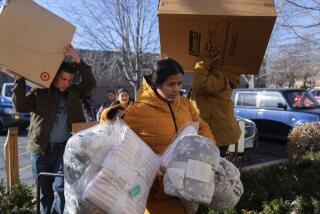Anti-Foreigner Sentiment Poses Peril for Asylum Seekers in Switzerland
- Share via
ZURICH, Switzerland — Osman arrived in Switzerland hoping to find a refuge from the imprisonment and persecution he said he had known in Turkey. Instead he is a virtual prisoner behind coils of barbed-wire designed to protect him from an ugly spate of racial attacks gripping the country.
“I thought I was coming to a peaceful democracy. Maybe I was mistaken,” said Osman, a Kurd who declined to give his full name. He is living in a refugee hostel in Steinhausen, heavily guarded since it was attacked recently.
In November a gang of teen-agers battered to death a 44-year-old Kurd, also from Turkey, on a street in Freiburg. This was two weeks after the hostel in Steinhausen was also attacked and damaged.
“For too long we have turned a blind eye to the outrages of these right-wing thugs. The birth of a new fascism in Switzerland has been trivialized,” the tabloid Blick said in an editorial after the Freiburg attack.
Politicians are pondering why such an affluent country with full employment should be blighted by xenophobia and racial hatred but are unsure how to tackle the problem.
A recent parliamentary inquest sharply criticized the authorities for their failure to protect the country’s 36,000 asylum seekers.
“I’m not certain how we can introduce fresh legislation without making Turks and Sri Lankans superior to Swiss people in the eyes of the law,” said Heinz Schoeni of the Federal Delegation for Refugees.
In the background is Switzerland’s traditional nervousness that its prosperity will dwindle if it opens its doors too wide to immigrants from the Third World.
The Justice Ministry said the number of asylum seekers entering Switzerland rose 54% in the first eight months of 1989 against the same period in 1988.
The fact that only about 6% of asylum applications are accepted does not diminish the resentment felt not just by racist vigilantes but by many ordinary Swiss.
As the political debate heats up, however, immigrants fear for their lives.
As Mustafa Yildrim and two fellow Kurds left a restaurant in the sleepy university town of Freiburg late in November, they encountered a group of teen-agers chanting racist slogans.
In the ensuing scuffle, Yildrim was beaten and died later of head injuries.
One youth was arrested in the killing. None of the teen-agers belonged to any right-wing organization.
Two weeks earlier members of a group called the Patriotic Front attending a rally in Steinhausen smashed windows and overturned furniture at a refugee hostel while the police looked on. Four people were arrested and were to face trial in the incident.
The group said it is opposed to violence and the leadership reprimanded members for the Steinhausen break-in.
The canton’s police director, Urs Kohler, admitted error on the part of his officers, and the hostel has since been ringed with barbed-wire while an officer guards the building at night.
Inside the long wooden huts, temporary home for 60 Kurdish and Sri Lankan asylum seekers, the men are frightened and angry.
“Why didn’t the police do anything,” asked Bekir, a young Kurd who has lived in the hostel for some months. “We feel helpless like babies--scared of the police, scared of the neo-Nazis and scared of being sent back to violence in Turkey if we retaliate.”
Unsatisfied with the level of police protection, the refugees have organized a 10-man rotation to keep a watch each night.
While the actions of skinhead gangs have prompted consternation, many observers are equally concerned by what they see as a “respectable” racism in mainstream Swiss society.
“These atrocities are the work of a few . . . but it is also true that the Swiss people are negatively inclined toward the asylum seekers,” said Ursula Meier of the refugee organization Asyl-Bruecke.
“Hatred and contempt are no longer the preserve of the Patriotic Front. Xenophobia is part of our everyday conversation in bars and restaurants,” said the Zurich daily newspaper Tages-Anzeiger.
The anti-foreigner National Action Party, which has three representatives in Parliament, condemns the racial attacks but has views on the reasons for them.
“These attacks are the fruit of our too liberal immigration policies,” its president, Rudolf Keller, said, adding that most Swiss people would support this view.
“They (immigrants) ought to go back to their own countries or to ones with similar cultures. Cultural diversity only brings unhappiness.”
However, last year Swiss voters firmly rejected an initiative by the National Action Party to tighten immigration policy.
Schoeni of the Federal Delegation for Refugees disagrees with Keller’s view.
“The overwhelming majority of Swiss people are positively inclined toward foreigners,” he said. “Besides, they know their economy would wilt without foreign workers.”
Switzerland has tried to stem its chronic labor shortage by allowing foreign workers to settle here. Partly as a result of this, nearly 15% of the population is non-Swiss.
Although industrialists say they continue to rely heavily on foreign labor, many people feel the limit has been reached--at least for unskilled, non-European workers.
“The boat is not yet full. But Switzerland is a luxury liner and while there is still room on the top decks, it is getting crowded down below,” Schoeni said.
More to Read
Sign up for Essential California
The most important California stories and recommendations in your inbox every morning.
You may occasionally receive promotional content from the Los Angeles Times.













